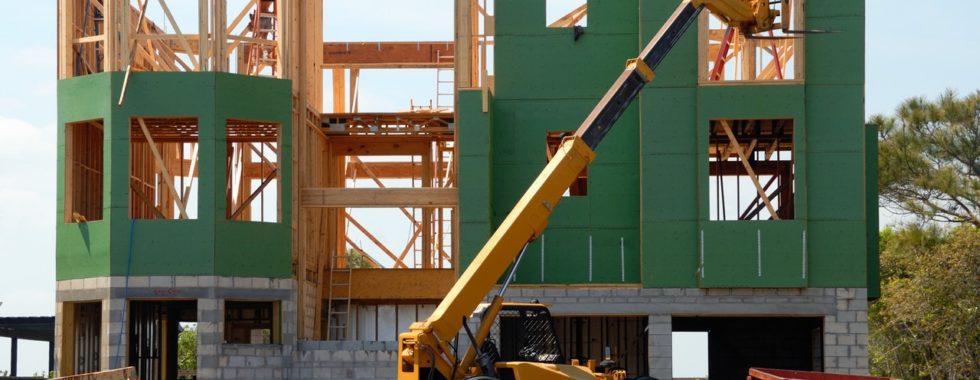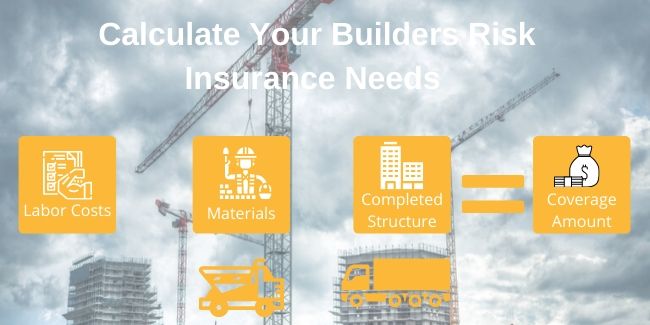
Builders Risk Insurance – A Contractor’s Lifeline
Did you know that there is a short-term property insurance policy that helps to reduce any risks and losses caused by damage while on a construction project? Known as Builder’s Risk Insurance, this policy provides protection for construction companies, contractors, and subcontractors.
Suppose that your construction company is preparing to begin building a new hotel. The preconstruction planning is complete, the appropriate work permits have been secured, the subcontractors have been hired, and your general liability insurance is current. Your company should be good to go, right? Did you know that your general liability insurance might not completely cover any and all damages during this project?
Not securing adequate coverage could lead to disastrous consequences. Imagine arriving at the job site only to find that the building’s framework has burnt to the ground with building materials damaged. It is possible that such losses may not be covered. A scenario such as this is why you may need to contemplate purchasing a builder’s risk insurance policy.
How Does Builders Risk Insurance Work?
Contrary to the commercial property insurance policy, which provides coverage for both completed buildings and the contents contained within, the builders risk insurance policy provides coverage for buildings during the actual construction phase.
Simply stated, the builder’s risk insurance policy is project-specific and provides coverage during the course of construction. Most insurers suggest that this policy begin prior to the arrival of construction materials at the job site and end once the property is either ready to be occupied or sold…
Oftentimes your client will require that you have a builder’s risk insurance policy secured since new construction and rehabilitations are considered high risk. However, the property owner or developer may have insurance coverage in place already, which will provide coverage for your business as well.
The amount of coverage that you will want in your builder’s risk insurance policy should equal at least the estimated value of the completed building or structure. In order to estimate the amount of your coverage you should secure, you’ll want to add the cost of labor, all construction materials, and the value of the land.
What does Builders Risk Insurance Cover and Not Cover?
The amount of coverage provided by the builder’s risk insurance policy varies depending on the construction project itself and the insurance provider. Most of these policies provide coverage strictly for events beyond your control. However, there are some policies that provide coverage for defects occurring during construction and losses or damages, except those clearly excluded.
Perils Covered
Customarily, the loss or damage covered by the builder’s risk insurance policy includes:
- theft
- fire
- weather events
- explosions
- vandalism
Some builders risk insurance policies may also cover:
- expenses associated with lost sales, loan interest, rental income, and real estate taxes due to construction delay
- removal of debris, cleaning, and the disposal of any pollutants
- damage to temporary structures, such as scaffolding
- changes to the construction site in order to meet environmental standards
Perils Not Covered
Builders risk insurance usually excludes:
- damages as a result of floods, earthquakes, and hurricane winds within beach zones (although, this coverage may be included in specified areas and riders may be purchased in other areas)
- corrosion, rust, and normal wear and tear
- theft from employees
- acts of terrorism
- incidents involving defective materials and work
Coverage also varies between buildings vs. structures
Upon assessing your options for builders risk insurance, pay extra close attention to when buildings and structures are mentioned, especially when only one is covered.
With regards to insurance-speak, a building is defined as a structure that will be occupied, such as apartment buildings, hotels, and homes. However, not all structures are considered buildings. Scaffolds are temporary structures that cannot be occupied, nor are they considered a building.
If your client’s contract requires insurance coverage for structures other than the building, it is possible that coverage will not be applicable if a claim is filed. It is important to speak with your licensed insurance agent regarding your builder’s risk insurance policy and when coverage ceases.

Get A Quote
Should I file a claim on my Builders Risk Insurance or general liability insurance?
The answer to this question depends on the case.
Ultimately, both your builders risk insurance policy and general liability policy provides coverage for damage caused by a subcontractor. It may not be in your best interest to file a claim under your general liability insurance in cases of construction failure.
In cases when coverage overlaps, and in order to keep your general liability insurance policy free from claims, file any claims for property damages with your builder’s risk insurance provider. Maintaining a clean claims history aids in keeping your premiums low.
Coverage provided by general liability insurance is a continuing expense. Construction clients will require that you have general liability insurance in order to cover damages associated with an injury at the construction site or in case your work damages a third party’s property.
In the event that you are sued for property damage occurring at the construction site, your general liability insurance will pay for court costs, attorney fees, and any resolutions deemed necessary by the court.
Are there any additional policies that general contractors and construction companies should consider purchasing?
General liability and builders risk insurance are not the only policies that contractors will need to purchase. Contractors and construction companies usually carry a combination of the following:
- Contractor’s equipment insurance: A type of inland marine insurance, this policy provides coverage for tools, building materials, bulldozers, and diggers. Reimbursement will be provided for damaged or stolen equipment under 5 years of age, including such items that are to be transported.
- Workers’ compensation insurance: Even on the safest construction sites, injuries can certainly occur. Therefore, it is a requirement in most states that companies carry worker’s compensation insurance, which will provide coverage for medical bills and the reimbursement of lost wages for an injured employee.
- General Liability: Contractors General Liability will be the foundation of protection for your business. The coverage will respond if you or your employees are found liable for bodily injury, property damage, or have a products/completed operations complaint. The coverage also covers defense costs for your business to respond to any lawsuits brought by a third party.
- Commercial Auto insurance: A commercial auto insurance policy provides coverage for businesses that own vehicles. However, if your employees use their own vehicles for work purposes beyond commuting, hired and non-owned auto insurance is the appropriate auto coverage.
- Surety Bonds: It’s very likely that your state will require you to be licensed before you can begin operations. Most states and customers will require contractors to offer a license or surety bond before you are allowed to bid on a job or begin working.
Although builders risk insurance can be complex, it is essential for general contractors and construction companies. Before you decide on which coverage to purchase, be sure to speak with a licensed insurance agent about which coverage is best for you.
Get A Quote

